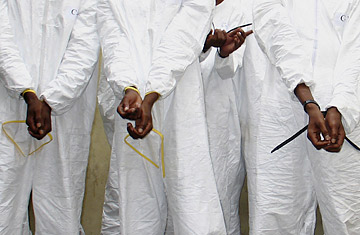
Suspected Somali pirates stand handcuffed inside a police cell in the Kenyan coastal city of Mombasa June 10, 2009.
In a move meant to ease the "mental anguish" of prison inmates and make it possible to put them to work, Kenya's president has commuted the sentences of the 4,000 people on death row to life imprisonment.
Kenya requires judges to impose the death penalty on those convicted of armed robbery, murder and treason. But death row inmates find themselves relegated to criminal purgatory because no one has been hanged — the legally required method of capital punishment — since 1987. President Mwai Kibaki said that commuting all of the country's death sentences would help alleviate the "undue mental anguish and suffering, psychological trauma and anxiety" that comes with being consigned to death row for an "extended stay."
Kibaki insisted during his announcement Monday that the decree does not mean courts will stop issuing death sentences. Indeed, judges will still be obligated to do so even for seemingly minor offenses, including cases of armed robbery where thieves have stolen chickens while wielding nothing more than wooden clubs. Still, the move allows Kibaki to sidestep a thorny political issue: While the death penalty remains popular among Kenyans, he has been loathe to incur criticism from human rights groups by signing execution orders.
Experts and rights activists have welcomed the new decree, but are greeting Kibaki's justification with some skepticism. Just as likely a culprit for the inmates' "undue mental anguish" is the fact that conditions in Kenya's prisons are, by most accounts, absolutely horrifying. Rights groups have repeatedly documented cases of death, torture, malnutrition and severe overcrowding within Kenya's prison system.
Experts say the more persuasive reason for the decision is, as Kibaki noted in his statement Monday, that Kenyan law confines those sentenced to death to their cells, barring them from taking part in prison work or study programs. A presidential press service statement said those rules had led to "idleness and subsequent negative impact on prison discipline as recently witnessed in some facilities."
The statement seemed to be referring to a recent parliamentary committee report that blamed death row inmates for bouts of violence earlier this year, including fatal attacks on prison wardens at two of the country's biggest prisons. "We haven't had the hangman for 22 years and these criminals have been very dangerous to society because they are idle," Casper Awuondo, a sociology professor at the University of Nairobi, tells TIME. "They have been using their mobile phones to threaten people, extort money, do all sorts of things, because they are idle."
Kibaki's announcement is good for the prisons as well as the prisoners, said Keriako Tobiko, director of public prosecutions. With one signature, the president has added 4,000 bodies to the work rolls of the country's undermanned and underfunded prisons department. "The Prisons Department has been unable to utilize over 4,000 prisoners who have been idle within their precincts," Tobiko told The Standard newspaper. "Reducing the sentence is the first step."
Kibaki has also asked government officials to try to figure out if the death penalty — or at least the threat of it — has helped deter crime at all in Kenya. The country is in the midst of a protracted, controversial constitutional review that includes a debate about the effectiveness of the death penalty.
So far, capital punishment appears not to have had much effect. Kenya is so beset by crime that it can be unsafe to walk in Nairobi at night, and carjackings and violent robbery are common. "In Kenya, [the death penalty] has not stopped murder — indeed, the rate has been going up by leaps and bounds — nor has it discouraged violent robbery," The Daily Nation said in an editorial after the decision was announced. There are no current figures for the crime rate in Kenya, but the U.S. State Department says there is a "high rate of crime in all regions of Kenya, particularly Nairobi, Mombasa, Kisumu, and at coastal beach resorts."
At the same time, while the state may not be killing death row inmates, human rights groups say that the number of extrajudicial killings by police has skyrocketed. In February, United Nations envoy Philip Alston concluded that there is a "systematic, widespread and carefully planned strategy" of executions by police, almost certainly conducted with the consent of their top brass. He called for the resignation of the chief of police and Kenya's attorney general. In response, Kenya denied the allegations and demanded Alston's removal from his U.N. envoy post.
"We're living in a situation of massively heightened criminality and insecurity and we're also living in situation where, due to failures in the criminal justice system, security services have resorted to extrajudicial killings as way to manage rising crime," says Muthoni Wanyeki, executive director of the Kenya Human Rights Commission. "We might not have legal executions taking place, but we certainly have illegal executions taking place." If Kenya truly wants to end the mental anguish of its prison inmates, it will need to tackle issues bigger than idleness.
